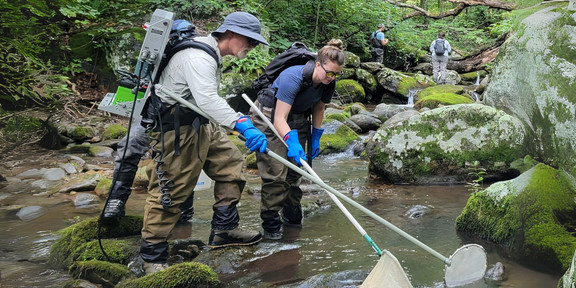Climate Change Threatens Fish Diversity: Nature Study Shows Declines in US Waters
- Research Alliance Ruhr
- UA Ruhr
- Research

"Species from the carp and true perch family, which prefer cool water, are increasingly losing their habitat as temperatures in rivers rise worldwide," explains Prof. Dr. Ralf Schäfer, environmental researcher at the University of Duisburg-Essen and the Research Center One Health Ruhr. For the study, he and an international research team analyzed long-term data on almost 400 fish species in North America. The data comes from the US Environmental Protection Agency (EPA), which collected samples from almost 3,000 locations between 1990 and 2019.
The results in rivers with an average temperature below 15 degrees Celsius are drastic: the number of fish here has shrunk by more than half and species diversity by around a third. At the same time, the researchers have observed that larger species such as trout perch and channel catfish, which are used for angling and fishing, are displacing smaller species in the cold rivers.
In rivers with water temperatures above 24 °C, the picture is different: In warm waters, both the number of fish and the diversity of species are increasing, with robust species in particular on the rise. However, this increase should not obscure the fact that species diversity as a whole is suffering. Introduced fish species and rising temperatures are interacting here and exacerbating the loss of biodiversity.
"Our results show how sensitive freshwater ecosystems are to climate change," emphasizes Schäfer. "Especially in cool rivers, the characteristic biodiversity is at risk of disappearing. The data from the USA is a clear warning signal for Europe, because we are observing the same trend here: rivers are becoming steadily warmer."
Together with his team, the environmental researcher also recently published a comprehensive database on the heat tolerance of freshwater organisms. This contains global data on many fish and numerous invertebrate species such as insect larvae and crustaceans, which in turn are key indicators of water quality.
Further information
About the publication: Rumschlag , S.L., Gallagher, B., Hill, R. et al. Diverging fish biodiversity trends in cold and warm rivers and streams. Nature (2025). https://doi.org/10.1038/s41586-025-09556-0
Prof. Dr. Ralf B. Schäfer, University of Duisburg-Essen, Department of Biology & Professor for Ecotoxicology Research, Center One Health Ruhr, University Alliance Ruhr Tel. 0201/18 3-3962, ralf.schaefer@uni-due.de
